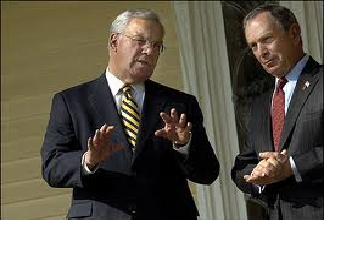Boston and New York: New Mayors, New Change?

Former mayors Menino (left) and Bloomberg (right) bostinno.streetwise.co
January 26, 2014
While it was an off year for both Presidential and Congressional elections, two races on Election Day 2013 still brought a significant change to millions of Americans. In Boston, beloved longtime mayor Thomas Menino, who was first elected in 1993, refrained from running again in 2013 due to an array of health problems. Menino, who is notable for his modest beginnings in a working-class Boston neighborhood without family political connections, had popular support among Bostonians. In his worst campaign for re-election, he still earned 15 percentage points greater than his closest competitor. Under the twenty years of his mayorship, Boston had experienced outstanding economic growth. Despite his more moderate economic policies, Menino was active in promoting ideals of social progressiveness. He wrote a letter directed to the CEO of Chick-Fil-A stating that the fast food chain is “not welcome” in Boston because of the company’s anti-gay stance.
In New York City, Mayor Bloomberg, who was first elected in 2001, was a moderate politician with a similar political stance to Menino. As a powerful business magnate, he ruled with business-friendly economic policies, unusual for an overwhelmingly liberal city such as New York. Like Menino’s, his social policies were quite liberal; he was particularly known for his strict stance on gun control (even appearing in a 2012 Super Bowl ad with Menino about the topic). Despite having by no means a modest economic background, Bloomberg, who is the 13th richest person in the world, was still generally well-liked among the people of New York during his twelve-year tenure as mayor.
However, both Menino and Bloomberg refrained from attempting to win another re-election term in the 2013 mayoral elections, and the election was left to newer, much less established candidates. In Boston, Democrat Marty Walsh narrowly won a roller-coaster campaign over more fiscally moderate candidate John Connolly, in part due to millions of dollars donated by labor unions. In New York, after a tight race for the Democratic nomination, Democrat Bill de Blasio won a landslide victory over Republican Joe Lhota; his election was aided by the appeal of his biracial family to the diverse New York City public. Both de Blasio and Walsh have been known as strong advocates for labor unions; Walsh, in particular, joined a union at age 21 and is currently the president of that union. Thus, there has been a significant change from the policies of the incumbent mayors of the two cities, who exhibited social liberalism but were more fiscally conservative. These new fiscally liberal, union-supporting mayors may contribute to a slowing of the excellent economic growth that both cities experienced in the first decade of the 2000s. Though the new mayors are very likable and easy to identify with – de Blasio, in particular – the formula of fiscal moderation and social progressivism had worked so well for these cities in the past, and the election of more economically liberal candidates doesn’t make much sense. The election of a moderate candidate like Christine Quinn would help these cities stay competitive for business in an increasingly globalized world.


